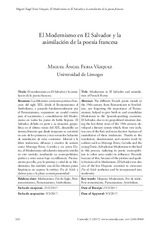El modernismo en El Salvador y la asimilación de la poesía francesa
Modernism in El Salvador and assimilation of French Poetry
Autor
Feria Vázquez, Miguel Ángel
Editor
Universidad de Córdoba, UCOPressFecha
2017Materia
ModernismoFin de Siglo
Postromanticismo
Parnasianismo
Simbolismo
Hispanic modernism
Fin de siècle
Post-romanticism
Parnassianism
Symbolism
METS:
Mostrar el registro METSPREMIS:
Mostrar el registro PREMISMetadatos
Mostrar el registro completo del ítemResumen
Las diferentes corrientes poéticas francesas
del siglo XIX, desde el Romanticismo al
Simbolismo, y pasando fundamentalmente por
el Parnasianismo, supusieron un caudal común
para el nacimiento y consolidación del Modernismo
en todos los países de habla hispana. El
Salvador, debido en parte a su situación geopolítica
en el último tercio del XIX, desarrolló un
sistema literario que desde temprano se convirtió
en uno de los primeros y más rotundos baluartes
de asimilación de estas corrientes. Merced a la
labor traductora, difusora y creativa de autores
como Mayorga Rivas, Gavidia y un joven Darío,
el Modernismo salvadoreño impartió cátedra
en este sentido, irradiando su cosmopolitismo
poético a otras zonas bajo su influencia. Precisamente
por ello, por lo prístino y cabal de su Modernismo,
fue también uno de los últimos países
hispánicos en superar la estética Fin de Siècle y
abrirse paso a la plena contemporaneidad. The different French poetic trends in
the 19th century, from Romanticism to Symbolism,
not forgetting the importance of Parnassianism,
helped to give birth to and consolidate
Modernism in the Spanish-speaking countries.
El Salvador, due to its geopolitical situation during
the last thirty years of the 19th century, developed
a literary system which, from very early,
was one of the first and most decisive bastions of
assimilation of these tendencies. Thanks to the
translation, desemination and creative work by
authors such as Mayorga Rivas, Gavidia and the
young Darío, Salvadorian Modernism to the lead
in this process, radiating its poetic cosmopolitism
to other areas under its influence. Precisely
because of this, because of the pristine and quality
features of its Modernism, El Salvador was also
one of the last Hispanic countries to overcome
Fin de Siècle aesthetics and be incorporated into
modernity.

